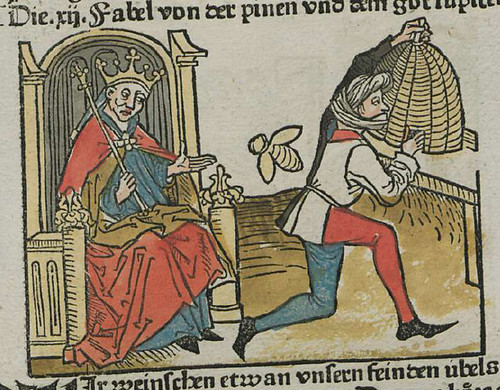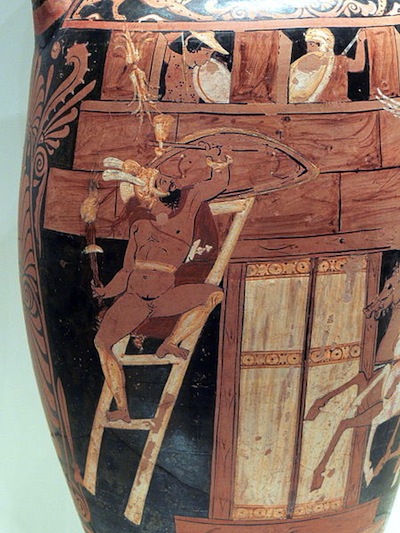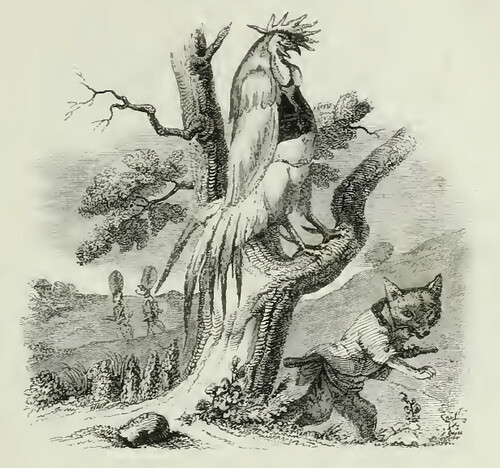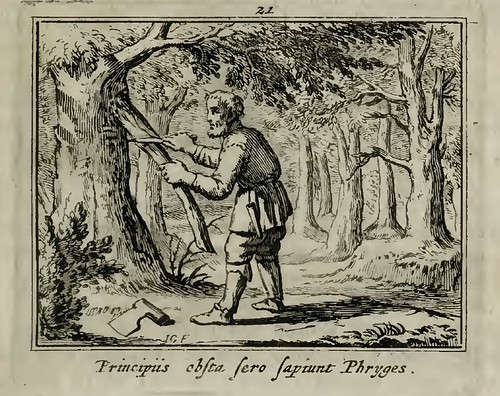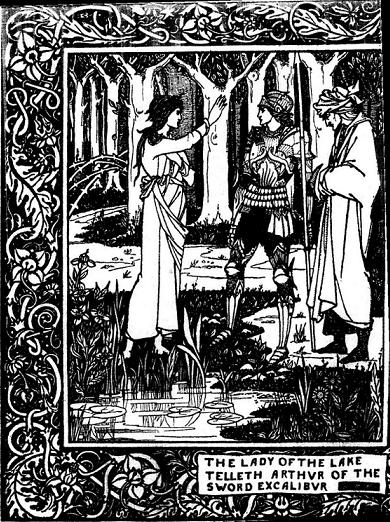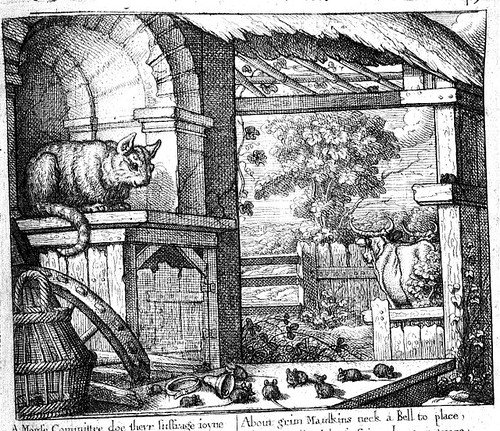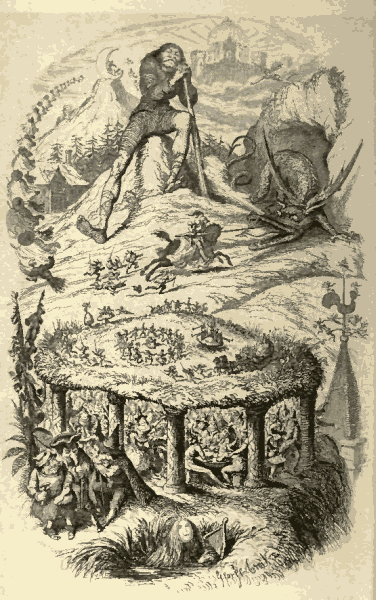The
Bestiaria Latina is a blog for people who like Latin. Whether you are just a Latin beginner or a Latin expert, I hope you will find something here to enjoy! This blog has been going for a long time (its name dates back to a project many years ago when I was working on Latin bestiaries), and it has morphed and changed over time. I thought it might be helpful to explain here how the blog works, so I've provided some information about that below.
I publish the blog every other day, although I do miss a day every once in a while - and there are occasional "special edition" posts like this one. Each regular post contains some of the same items, and there is also some variety from post to post in terms of the items that are included. Here are the items you will find in each regular post:
- Roman Calendar: The name of the day according to the Roman calendar; you can get your own Roman calendar here: Roman Calendar.
- Myth Image: There is a mythological image (usually a painting) each time, with a link to a post that provides some background about the image. You can page through the complete calendar of images here: Myth and Legend Images.
- Brevissima: These posters contain Latin poems that are just two lines long. There is a link to a separate blog post for each poem where you can find vocabulary and information about the source; some also have English translations. You can find all 1001 of these poems here: Disticha Latina blog.
- Latin LOLCats: There are actually two Latin LOLCats for each blog post because I publish a new Latin LOLCat at my Proverb Laboratory blog every day: Latin LOLCats blog.
- Fabulae Faciles: These are Aesop's fables that have been rewritten with very simple syntax, along with a vocabulary list.
- Mille Fabulae: These are Aesop's fables that come from my Mille Fabulae et Una book. You can find all 1001 of these fables here: Mille Fabulae et Una blog.
- Myth and Folklore Books: Not all of these are classical (in fact, most of them are not), but since I share these free Kindle ebooks with the students in my Mythology and Folklore classes, I thought I would share them here too, assuming that people with an interest in the classics might be interested in other storytelling traditions around the world.
Those are the items that appear in the blog every time. In addition, there are various items that appear in an alternating fashion, either in every other blog post or in every third blog post.
- Greek LOLz. These are animated GIFs that I made with a Greek proverb, a Latin translation, and an English translation. There is a link for each one to a blog post which allows you to view each image separately, in addition to the animation.
- Greek Bible Art. Likewise, the Bible art images have a Biblical verse (or part of a verse), which appears in Greek, then in Latin, then in English, with a link to a blog post that shows each image separately.
- Latin Mottoes and Proverbs: I have collected many two-word and three-word proverbs, along with rhyming proverbs, proverbs from Erasmus, proverbs from Polydorus, and proverbs from Publilius Syrus. These all have English translations.
- Greek Proverbs: I have a set of Greek proverbs also, with an English translation.
- Vulgate Verses: These are verses from the Vulgate Bible. They do not come with an English translation, but I provide a link to a polyglot online Bible that includes English.
- Elizabethan Proverbs: These are proverbs with Renaissance English commentary that I found in Conybeare and Taverner. The English of the Elizabethan period is quite fun to read!
December: Gaudium Mundo. During the month of December, I also have Latin holidays songs. You can see the Latin holiday songs all in one place here:
Gaudium Mundo. I'll be starting that up on December 1 as always.
Blog delivery. Many people choose to receive the blog via email. At the actual
Bestiaria blog site, there is an email sign-up box in the blog sidebar. You can sign up and leave the list
ad libitum. When you do sign up, there is a confirmation email that you must click on (that's to protect people from spam). So, make sure to check your email inbox (including possibly the junk mail folder) to find that confirmation email. It should arrive immediately after you sign up.
Blog widgets. If you visit the blog site itself, you will see some randomizing widgets in the sidebar that provide additional content. These are built with an amazing free tool created by one of my students:
RotateContent.com. You can find a more-or-less complete inventory of the widgets I have published at the
Schoolhouse Widgets site, and you can use them at your own blog or website, anywhere that javascript is allowed. If you would like to learn how to use the tool yourself to create your own widgets, I have information about that here:
How to Make Random and Date-Based Widgets.
Blogger.com. I use Google's free blogging service for this blog. If you are interested in having a blog of your own, I can highly recommend
Blogger.com. It's incredibly easy to use, and Google has been adding new improvements to the blogging platform over the years which have kept me very satisfied.
About Me: I used to be a Classics professor at the University of Oklahoma, but I resigned that job many years ago in order to teach online, which is a choice I am very happy with. Teaching online has allowed me to be the kind of teacher I always wanted to be; with the Internet as my classroom, my students and I are able to have learning adventures unlike anything I ever could manage in a traditional classroom. I have been teaching online courses at the University of Oklahoma for over 10 years now (I teach English writing courses), but the Classics department adamantly refuses to let me teach Latin online.
Vae mihi! I finally gave up that quest, so I am no longer producing new Latin materials (pretty much all the materials I created here were in hopes of being allowed to teach Latin again at my school). Over these many years of working on Latin fables and proverbs, I now have plenty of material to keep the
Bestiaria Latina blog going
ad infinitum. If you are curious about my online teaching and other projects that I am involved in, I am very active at the Google+ social network, which is a great place for educators to meet and share ideas! Here is
my Google+ page, and you can also find me at
Twitter (although I am not so active there).
Gratias ago vobis! Thanks to everyone for your interest in the blog! This is something I would do as a hobby for its own sake because it is a lot of fun for me and it helps keep my Latin alive. It's even better, though, to know that there are some others out there who enjoy the Latin also. :-)
Here is one of those poem posters - no, that's not a picture of me, ha ha. But the poem does express how much I enjoy this work:
sic erit hora brevis et labor ipse levis.




